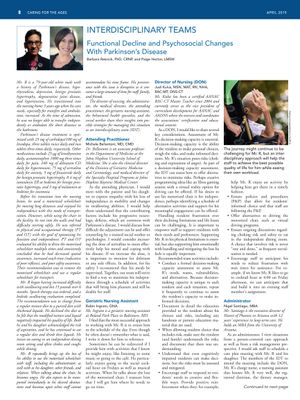Functional Decline and Psychosocial Changes With Parkinson’s Disease
April 2019

TLDR The interdisciplinary approach improved the quality of life for a Parkinson's patient and eased staff workload.
The document from April 1, 2019, details the case of Mr. R, a 79-year-old male with Parkinson's disease, and the interdisciplinary team's approach to managing his functional decline and psychosocial changes. The team focused on empathizing with Mr. R's loss of independence, potentially increasing his antidepressant dosage, supervising meals, assessing decision-making capacity, offering alternative activities, and training staff on care declines. They also encouraged staff flexibility, involved Mr. R's daughter in discussions, and used creative interventions like an Xbox gaming system. Despite Mr. R's refusal to increase his antidepressant medication and his initial refusal of a modified diet, the team successfully updated his care plan to improve his quality of life, which included agreeing to a mechanical soft diet and moving to a supervised dining room. The interdisciplinary approach was effective in enhancing Mr. R's quality of life and easing the staff's workload.